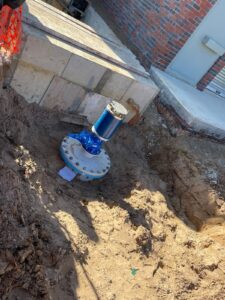On Monday, July 4, 2022, the Executive Mayor of Nelson Mandela Bay, Cllr. Eugene Johnson, and the Minister of Water and Sanitation, Senzo Mchunu, presided over the commissioning of the KwaNobuhle Pump station, a Metro intervention that began in July 2021 to alleviate the ongoing seven-year drought-induced water crisis.
The commissioning of the plant forms part of a joint effort between the City and the national government to keep the municipality supplied with water.
Explaining the significance of the plant, Director for Water & Sanitation, Mr Joseph Tsatsire, said that “The KwaNobuhle Pump station at Chelsea Reservoir will enable a wider distribution of water from the Nooitgedacht Water Scheme to ensure that more communities have running water.”
“The plant is expected to pump between 30 and 60 million litres per day to augment supply,” said Tsatsire.
As the metro adds capacity to combat the drying of taps in parts of the City, the slight decline in water consumption from 293ml/d 100 days ago to 246ml/d as of Monday 4, July 2022 is welcome.
As a result of the steady decline in water consumption, The Metro is cautiously optimistic, noting that efforts such as expanding water collection points, fixing rampant water leaks, and increased communication have started to make a difference.
Although there has been an improvement in the strategic areas, which include the repair of leaks, water restrictions and drilling of boreholes, Minister Mchunu said that “there is still a need for more progress.”
So far, a total of 3097 water leaks have been repaired since June 20, 2022, against a backlog of 3231. Some of the leaks repaired by the teams were unreported water leaks discovered during the “water leak festival.”
NMBM Water Crisis Spokesperson Luvuyo Bangazi said that the City is “still very concerned about capacity in the local dams with only 2.25% of useable storage, and as such, the JOC urges water users to continue reducing consumption to less than 50 litres per day per person to secure water for everyone”.







